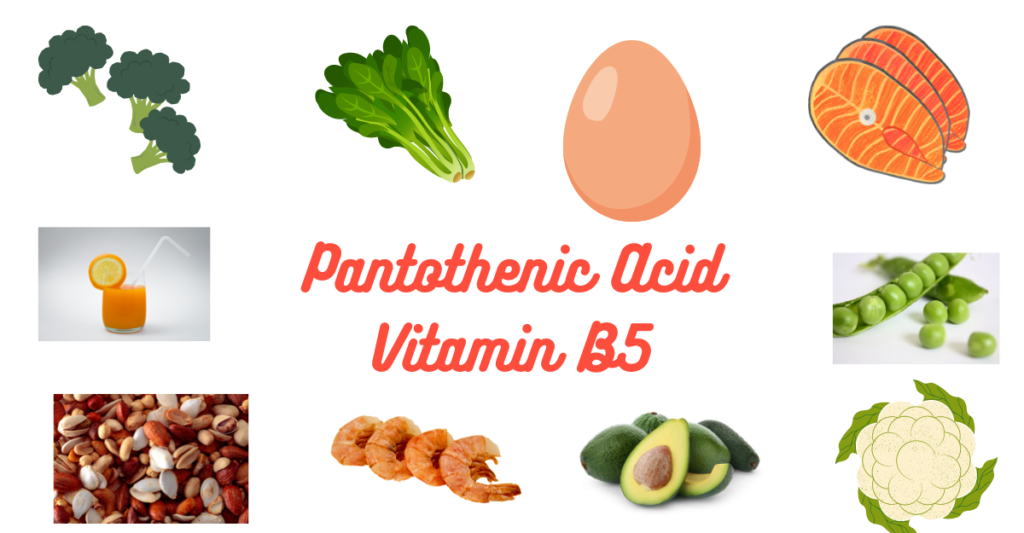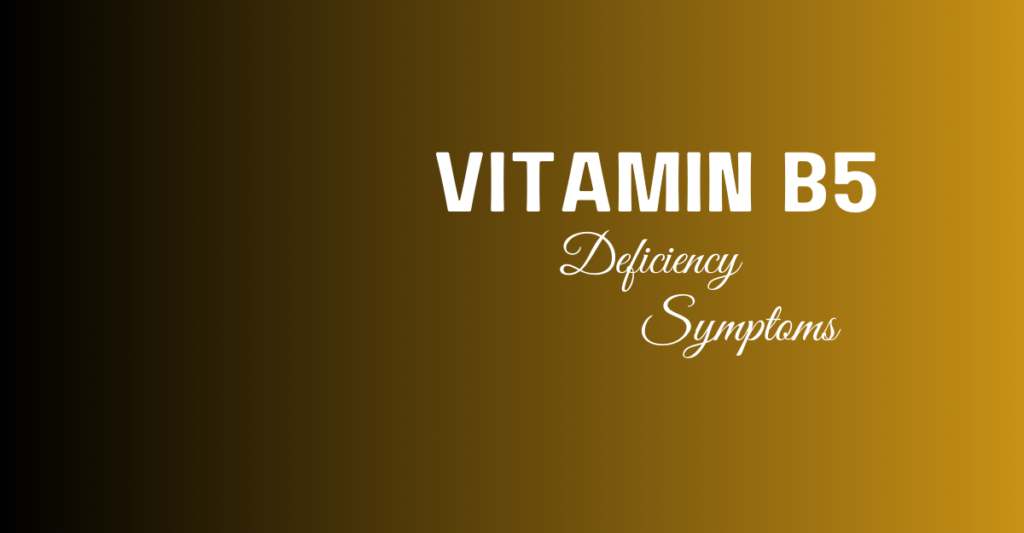Vitamin B5 Pantothenic Acid
Vitamin B5 or Pantothenic Acid, is a necessary nutrient that’s demanded by the body for numerous functions. This water-soluble vitamin must be entered through diet since the body is unfit to produce it on its own.
- Health benefits of Vitamin B5
- Food Sources
- Vitamin B5 deficiency symptoms
- Recommended Daily Intake
- Conclusion
- FAQ
- What are the benefits of Vitamin B5?
- What's Vitamin B5 Pantothenic Acid?
- How does Vitamin B5 contribute to energy product?
- How does Vitamin B5 ameliorate skin health?
- How does Vitamin B5 boost brain health and cognitive function?
- How does Vitamin B5 maintain a healthy heart?
- How does Vitamin B5 balance cholesterol situations?
- What are the salutary sources of Vitamin B5?
- How can I incorporate Vitamin B5 into my diet?
In terms of chemistry, vitamin B5 belongs to the B-complex family of vitamins and is used in a number of metabolic conditioning. It’s an essential part of coenzyme A, a molecule that is important for energy product as well as the creation of certain hormones, adipose acids, and cholesterol.
Health benefits of Vitamin B5
- Supports energy production
- Maintain skin health
- Supports nerve function
- Cholesterol Metabolism
- Surgery and Wound Healing
- Supports the production of red blood cells
Energy production: The acyl carrier protein and co-enzyme A are the two components of vitamin B5, both of which are essential for the release of energy from food.
Maintain skin health: Vitamin B5 is vital for the production of skin cells and helps in producing the oils that keep the skin smooth and moisturized.
Supports nervous system function: Vitamin B5 assists in neurotransmitter synthesis, which is essential for appropriate nerve communication and cognitive function.
Cholesterol metabolism: Recent research indicates that elevated dosages of pantethine (a stable form of vitamin B5) could potentially lower triglyceride and cholesterol levels in individuals with high cholesterol.
Surgery and wound healing: Pantothenic acid and ascorbic acid work well together to improve postoperative care and wound healing.
Support the production of red blood cells: Vitamin B5 is involved in the production of red blood cells.
Food Sources

Getting enough vitamins B5 is crucial to staying as healthy as possible. The following are some great food sources of pantothenic acid:
| Fatty fish | Salmon, tuna, sardines, herring, etc. |
| Shrimp and lobster | Shrimp is often eaten with oysters (or shrimp), or shrimp is added to caviar. |
| Eggs | Eggs are often cooked with salmon, tuna, shrimp, or other seafood. |
| Shellfish | Sea scallops, mussels, clams, oysters, and squid are all good sources of B5. Shellfish also contain selenium, which has been shown to reduce the risk of cardiovascular disease in humans. |
| Leafy greens | Kale, arugula, collards, Swiss chard, spinach, and other leafy greens are all good sources of vitamin B5. They may also contain other antioxidants like beta-carotene. |
| Nuts and nut products | Cashew nuts, almonds, macadamia nuts, pecans, pistachios, pine nuts, walnuts, and other nuts are all good sources of vitamin B5. Some studies indicate that they contain up to 40% of the total vitamin B5 in their nuts. Peanuts are also good sources of vitamin B5, especially of the L-arginine. |
| Fresh juice | Fresh and frozen fruit, such as oranges, grapefruits, and berries, as well as vegetable juice and fresh and canned vegetables, are all good sources of vitamin B5. |
| Plant foods | Plant foods, such as broccoli, cauliflower, Brussels sprouts, and Brussels sprouts, can be used as substitutes for fortified grains or breads. |
Vitamin B5 deficiency symptoms

Deficiency in Vitamin B5 is rare, but can lead to symptoms such as
- Fatigue
- Irritability
- Insomnia
- Stomach pains
- Numbness or tingling in the extremities
In severe cases, a deficiency can cause neurological symptoms such as confusion and muscle cramps.
Recommended Daily Intake
The RDAs (recommended dietary allowances) for vitamin B5 depends on age and gender.
| Age Group | Male | Female |
| Infants (0-6 months) | 1.7 mg | 1.7 mg |
| Infants (7-12 months) | 1.8 mg | 1.8 mg |
| Children (1-3 years) | 2 mg | 2 mg |
| Children (4-8 years) | 3 mg | 3 mg |
| Children (9-13 years) | 4 mg | 4 mg |
| Adolescents (14-18 years) | 5 mg | 5 mg |
| Adults (19 years and older) | 5 mg | 5 mg |
| Pregnant women | – | 6 mg |
| Breastfeeding women | – | 7 mg |
Conclusion
In conclusion, vitamin B5 pantothenic acid is an essential nutrient that offers a myriad of benefits for our overall health and heartiness. From supporting energy product to enhancing skin health, adrenal function, brain health, heart health, and vulnerable system, vitamin B5 plays a pivotal part in colorful fleshly functions.
By ensuring an acceptable input of vitamin B5 through a balanced diet or supplementation, we can harness its important goods. Including vitamin B5-rich foods similar as eggs, meat, avocados, and whole grains in our diet can help us meet our recommended daily intake. Also, considering vitamin B5 supplements under the guidance of a healthcare professional may be beneficial for individualities.
FAQ
What are the benefits of Vitamin B5?
Pantothenic acid, or vitamin B5, has numerous advantages. It enhances energy production, balances cholesterol levels, enhances brain health and cognitive function, enhances skin health, and keeps the heart healthy.
What’s Vitamin B5 Pantothenic Acid?
Vitamin B5, commonly known as pantothenic acid, is a water-soluble vitamin that is essential for many bodily processes. It involves in the metabolism of energy, the health of the skin, the brain, the cardiovascular system, the susceptible systems, and more.
How does Vitamin B5 contribute to energy product?
Vitamin B5 aids in the production of coenzyme A, a molecule that converts nutrients from food into useful energy. It helps to break down carbs, lipids, and proteins into energy products.
How does Vitamin B5 ameliorate skin health?
Vitamin B5 has significant benefits for skin health. It helps ameliorate skin hydration, reduces inflammation, and promotes crack mending. These goods make it a popular component in skincare products.
How does Vitamin B5 boost brain health and cognitive function?
Vitamin B5 contributes to brain health and cognitive function by sharing in the conflation of neurotransmitters similar as acetylcholine, which are essential for memory and literacy. It supports overall brain function and internal clarity.
How does Vitamin B5 maintain a healthy heart?
Vitamin B5 has been linked to bettered cardiovascular health. It improves cholesterol and triglyceride metabolism, promotes healthy blood lipid conditions, and promotes overall heart health.
How does Vitamin B5 balance cholesterol situations?
Vitamin B5 plays a part in maintaining healthy cholesterol situations. It’s involved in the conflation of coenzyme A, which is essential in cholesterol metabolism. Acceptable input of vitamin B5 can help promote a healthy cholesterol profile.
What are the salutary sources of Vitamin B5?
Vitamin B5 can be set up in a variety of foods, including meat (especially organ flesh), fish, eggs, dairy products, legumes, whole grains, and some vegetables similar as broccoli and avocados. It’s also come in supplement form.
How can I incorporate Vitamin B5 into my diet?
To insure an acceptable input of Vitamin B5, include foods rich in this nutrient in your diet. These include flesh, beef, fish, eggs, dairy products, legumes, whole grains, and lush green vegetables. Also, you may consider taking a Vitamin B5 supplement, but it’s always stylish to consult with a healthcare professional before starting any new supplements.

